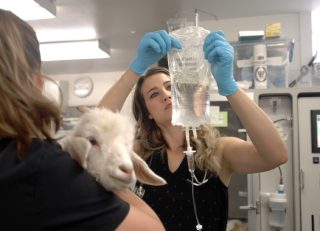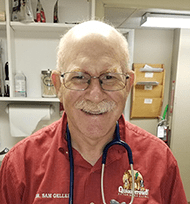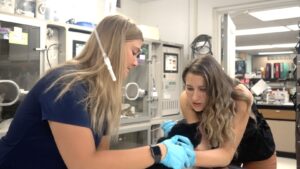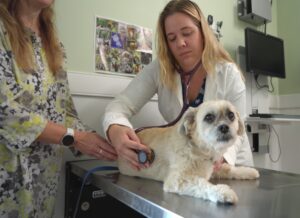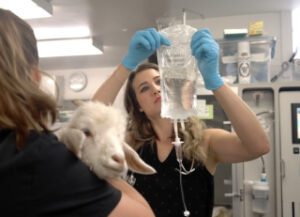In the world of veterinary medicine, the pursuit of excellence and innovation never wanes. As our understanding of animal health and well-being deepens, so too does our commitment to advancing the field through research and cutting-edge treatments. At the heart of this quest for progress lies the realm of veterinary clinical trials.
Over the last 20 years at Quakertown Veterinary Clinic, our team has participated in countless clinical trials for pharmaceutical companies that have helped bring various medications and biologics to market for a variety of animals. Not only does our participation in clinical trials benefit the patients we treat, but it also serves our clients, advances the skills of our doctors, and allows us to evolve veterinary medicine at scale.
Behind the Scenes of Veterinary Clinical Trials
To participate in veterinary clinical trial, we have assembled a team of veterinarians and assistants thoroughly trained in Good Clinical Practices. This guideline is used in the United States, European Union, and Japan, outlining how clinical trials should be conducted to ensure safety and consistency in new drug approvals.
The FDA (Food and Drug Administration), responsible for pharmaceuticals, and the USDA (United States Department of Agriculture), responsible for biologics, mandate that pharmaceutical companies go through a strictly regulated approval process ensure the protection our animal patients and ourselves.
This process typically begins with safety studies and toxicology studies conducted in laboratories, where medication compounds are tested in various ways and altered to be safe in the target species using both the indicated dose as well as higher doses. Once the product is deemed safe, a proof-of-concept study is created to show that the Investigational Product is effective in either treating the target disease or blocking the disease-causing agent.
The final phase is a nationwide pivotal trial to show efficacy and identify any safety issues that may show up in a larger population. The data from the entire process is collected and submitted to the FDA or USDA for final evaluation and can take anywhere from three to five years to be approved.
The Benefits of Having an On-Site Clinical Trials Department
There are many benefits to offering clinical trials at Quakertown Veterinary Clinic, starting with the patient. Those participating in the study receive state-of-the-art care and diagnostics, as well as medications and/or vaccinations at no cost to their owners. Many owners cannot afford current therapies for their pet, so their participation helps their pet receive care that otherwise would not have been possible.
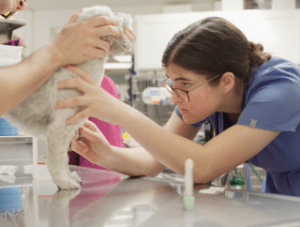
In addition to being helpful for owners and beneficial to the animals we treat, clinical trials are also extremely rewarding for our dedicated staff. The study doctors in our clinical trials department gain exposure to innovative therapies and trainings that undoubtedly improve their expertise in the diseases or technologies being studied. Other staff not directly involved in studies, including associate doctors, also benefit from these trials as they gain the confidence to adopt new products in the hospital because the study team has already used the product and can vouch for its safety and efficacy.
The hospital also benefits financially from a new profit center. Often, clinical trials are often more lucrative than what our clinic earns from clients for current treatment options. In addition, clients often receive additional benefits from the study company in the form of hospital clinic credit, which can be used at the owner’s discretion for any number of things for their pets.
How Our Team has Contributed to the Advancement of Veterinary Medicine
At Quakertown Vet, we have been extremely proud to participate in hundreds of clinical trials. We are pleased to have helped to make countless medications available, including:
- Cerenia: Used for treating vomiting.
- Apoquel: Prescribed for managing allergic itch.
- Bexacat: The first oral diabetes treatment for cats.
Our team has also aided in frontier technologies like monoclonal antibodies. We used mAb for the first time in veterinary medicine to manage osteoarthritis in dogs and cats and allergies in dogs. We have also participated in safety studies for different types of vaccinations that will provide easier administration by simpler routes or lower vaccine volumes.
How You Can be Part of the Future of Vet Med
If you are interested in research but you do not want to work in a laboratory or university setting, consider adding the opportunity to become part of the rewarding process of helping bring new products to veterinary medicine through clinical trials. There is nothing more rewarding than seeing a product on a shelf or prescribing a medication for a patient and thinking, “I helped get that approved!”
To learn more about how you can potentially join our clinical trials team at Quakertown Veterinary Clinic, connect with a team member today.
